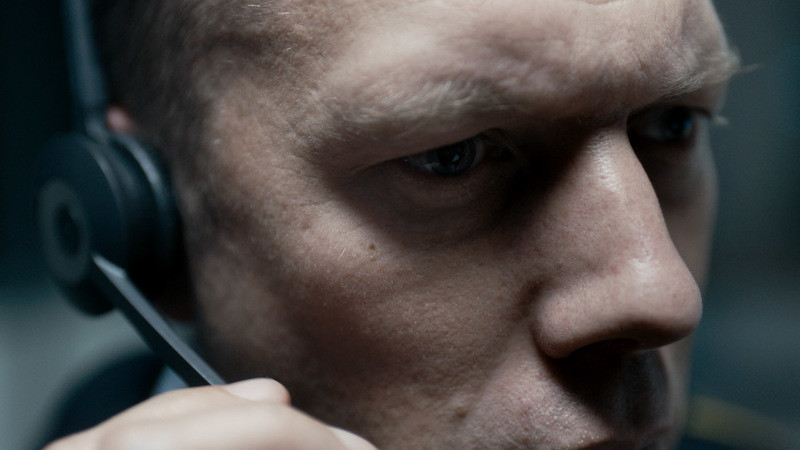The World Cinema Competition line up can easily get neglected in Sundance amid the buzz around US Competition films and high-profile premieres. But it’s always a good idea to keep an eye on this wide-ranging crop to discover surprising gems along the way. Three films that screened during the first two days of the festival—“Loveling” (Gustavo Pizzi), “Pity” (Babis Makridis) and especially “The Guilty” (Gustav Möller)—already set the bar high in that regard. While different in temperament, place of origin and aesthetics, all three films find their main subjects at life-defining crossroads and are products of singular visions behind the camera and on the page. They feature complex character studies, grounded in a well-realized sense of place and time.
Gustavo Pizzi’s “Loveling” (from Brazil/Uruguay) follows Irene (Karine Telles), a married mother of four living in an unkempt, decaying house outside of Rio de Janeiro. By all measures, she leads a joyous, happy life surrounded by the spraying taps and crumbling walls of her hectic, colorful house that seems to be bursting at its seams. Despite the chaotic mess around her however, the details of her life warmly add up to a close-knit and amorous co-existence with her beloved family. But when Irene’s oldest son Fernando, a gifted local handball player, gets recruited by a professional team in Germany, her life turns upside down as she prepares for Fernando’s fast-approaching departure in three weeks time. Fretful and vulnerable during this time crunch, Irene worries about her son’s future and her own aimless prospects after her son’s impending journey.
Also a co-writer of the film alongside Pizzi, Telles brings the sweet-natured Irene to life with an organic sense of realism and charts her journey of mid-life reinvention—as she earns her high-school diploma, reevaluates her family’s living arrangements and protects her sister from an abusive husband along the way—with superior attention. Elevated by rich, Pedro Almodovar-esque colors and an elaborately-conceived set design, Pizzi’s film loosely brings to mind “My Happy Family” (Nana & Simon) from last year’s Sundance in its study of an unconventional, frenzied family life against the backdrop of a culture, and a defiant female navigating various dynamics while seeking her own voice. The comparatively naturalistic “Loveling” doesn’t quite grab the viewer as intimately and in much detail as “My Happy Family”—its free-flowing rhythm renders a more intricate exploration of Irene, and her newfound appetite for a different kind of existence, unviable. Yet, the bigger picture still manages to paint an unruly, idiosyncratic collective with tender devotion.

The maximalist images and environs of “Loveling” stand in direct contrast to the minimalist, sterile design of Babis Makridis’ “Pity,” a disturbing and oftentimes very funny satire-drama from Greece/Poland. The second co-writing collaboration of Makridis and Efthimis Filippou (the scribe also wrote Yorgos Lanthimos’ “Dogtooth” and “The Lobster”), “Pity” is about that complex, primal human craving called empathy and the distance we’re willing to go to summon it from fellow humans. One increasingly desperate man in deep need of explicit compassion is an unnamed hero-turned-villain, sternly played by Greek comedian Yannis Drakopoulos. He lives in a coastal, picturesque city in Greece, in a symmetrical, high-end apartment with his young son and loyal dog. Sullen and motorized, he works at a corporate office, routinely tends to his son’s needs, occasionally goes to the beach and, well, visits his comatose wife, a victim of a recent freak accident, at the hospital. His wife’s ongoing tragedy neatly caters to his needs: addicted to sympathy, he egotistically milks favors from others, including a co-worker eager to give him a hug or a concerned neighbor who willingly bakes him an orange cake every morning. But once his wife awakens in due course and goodwill of strangers dies down, he finds he has to manufacture situations to stretch out the pity party.
“Pity” boasts a quiet color palette that blends in with its sparse compositions. Makridis’ use of negative space in every frame purposely alarms and isolates the viewer. Hovering between laugh-out-loud hilarious and borderline cringe-worthy moments, the gradually darkening “Pity” inevitably recalls the robotic rhythms and uncomfortable humor of Yorgos Lanthimos’ films through Filippou’s unmistakable stamp as a screenwriter. In the end, the film feels closer to a successful experiment than a fully flushed out narrative with a weighty point. Yet still, beneath its impeccable façade, lurks an almost accidental subtext worth considering: are we all addicted to constant drama and consequent affirmation in our daily lives? It’s a valid question.

I saved the best for last. The stunning Danish thriller “The Guilty” from debuting director Gustav Möller not only takes the minimalism of space to an extreme—the entire film takes place in a single location—but also impressively shrinks its story’s time span down to bare essentials. The tense, continually surprising story of Asger Holm (Jakob Cedergren, tremendous), a recently demoted emergency responder who visibly detests his desk job, starts and unfolds in real-time, when he answers a disconcerting call from a woman (Iben, in an astounding voice performance by Jessica Dinnage) who cryptically claims she is being kidnapped. With his life and entire career at stake in a mysterious hearing he’s prepping for the next day (the details of which we only gradually find out), Asger puts his investigative skills and well-intentioned (yet clearly unsound) instincts to work in order to save Iben’s life. Through a series of phone calls, poorly judged decisions and incessant quick thinking, he finds himself facing a dead-end he has to backpedal from.
Very much like Steven Knight’s tightly woven drama “Locke,” “The Guilty” splendidly makes its single location and real-time construct its biggest assets, while utilizing every possible tool and avenue with precision. Throughout the film, co-writers Möller and Emil Nygaard Albertsen inquisitively explore Asger’s headspace, illuminating the dark corners of his mind in steady drops of reveals and (without getting into spoiler territory) prove they have something to say about our unchallenged perception of gender norms. This polished, well-calibrated thriller—that could’ve also made a splash as a Midnight film at the festival—is a best-in-class showcase of the possibilities of cinema even with the most limited of resources. It’s also a star-making vehicle for the acclaimed actor Jakob Cedergren, whose pitch-perfect portrayal of a man under pressure leaves a mark through the film’s demanding long-takes.












